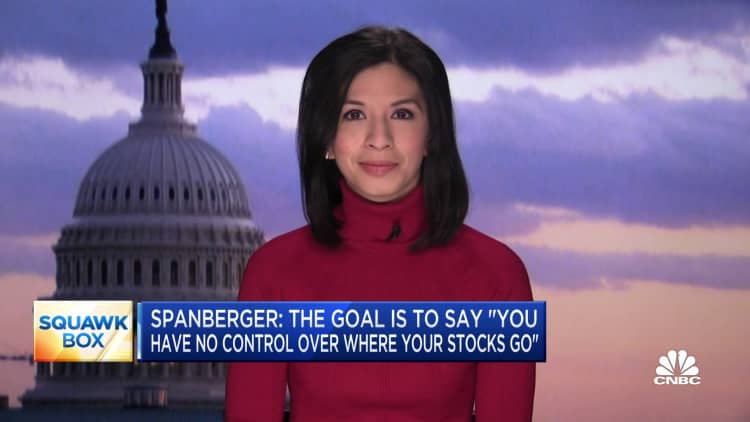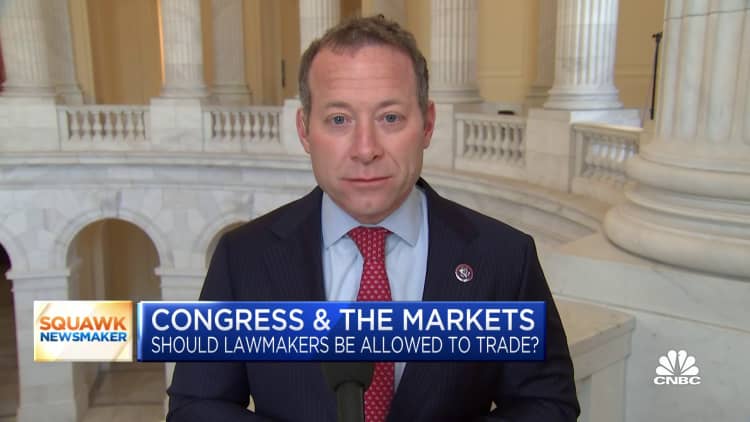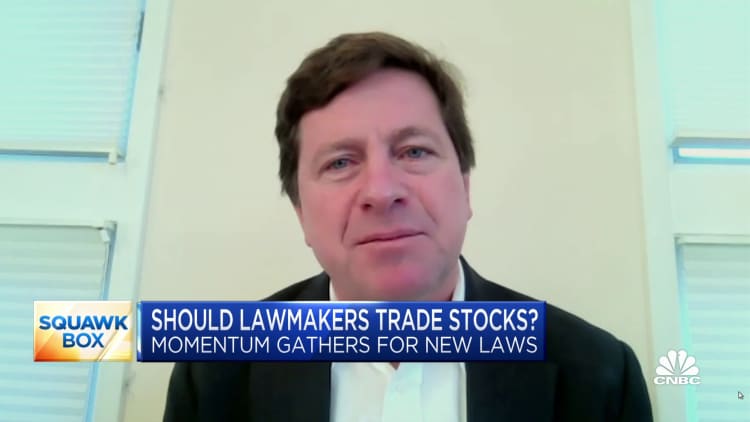
Congress often talks tough about reining in Wall Street. But now there's growing pressure on Capitol Hill to curb lawmakers' own trading.
Sen. Jon Ossoff, D-Ga., who has emerged as a leading voice on the issue, plans to introduce legislation by the end of the week that would require members of Congress – along with their spouses and dependents – to put their assets in a blind trust. But he's not alone. There's some bipartisan support in Congress for limiting members' trading activity.
The push comes after several lawmakers generated controversy over financial transactions conducted as Covid-19 was sweeping the country, including Sens. Dianne Feinstein, D-Calif., and Jim Inhofe, R-Okla. The Securities and Exchange Commission is investigating whether stock sales made by GOP Sen. Richard Burr of North Carolina just before the lockdowns began in 2020 amounted to insider trading. The Justice Department dropped its probes into Burr, Feinstein and Inhofe.
According to Capitol Trades, which tracks lawmakers' disclosures, members of Congress and their immediate family bought and sold $515 million in stocks and other assets over the past year. Analysis by Capitol Trades showed the most active sectors were tech, energy, telecom and media. Lawmakers with the most activity included Reps. Josh Gottheimer, D-N.J., Ro Khanna, D-Calif., and Scott Franklin, R-Fla.
Many of Gottheimer's holdings were listed as joint assets. He told CNBC's "Squawk Box" on Thursday that lawmakers shouldn't ben directly involved in trading stocks. A spokeswoman for Khanna said the stocks belong to his wife, and he does not own or trade individual assets.
Franklin's trades also include some joint transactions. A CNBC review of his disclosures showed he conducted about a dozen trades worth between $34 million and $155 million.

Ossoff's bill would carry penalties for lawmakers who don't comply with the rules. A person familiar with the proposal said Ossoff is seeking a GOP senator to co-sponsor the bill.
"I'm an advocate for banning stock trading by members of Congress who make policy, who have access to information and economic forecasting," Ossoff said Tuesday during a Senate hearing.
Ossoff, who formerly ran a documentary film studio, has estimated his net worth to be several million dollars. In March, he put his own assets into a blind trust, fulfilling a 2020 campaign promise made amid accusations that Georgia's then-senators, Republicans David Perdue and Kelly Loeffler, profiteered from the pandemic. Ossoff defeated Perdue in their election, while fellow Democrat Raphael Warnock unseated Loeffler, whose husband is chairman of the New York Stock Exchange. Perdue and Loeffler denied wrongdoing, and the DOJ dropped a probe of Loeffler's activity.
Democratic Rep. Abigail Spanberger of Virginia said she was dismayed by the allegations of insider trading on the Hill. She vented her frustration alongside Rep. Chip Roy, R-Texas, while on the House floor. They decided to start working together on a proposal that would also require lawmakers, spouses and dependents to use a blind trust while in office.
Spanberger and Roy initially introduced the Trust in Congress Act in June 2020. It was reintroduced for this session of Congress, and 14 other lawmakers – Republicans and Democrats – have co-sponsored it.
"It's about accountability, but it's also about ensuring that the perception, and the ability of our constituents to trust us is much easier because they don't have to wonder about our motivations," Spanberger told CNBC in an interview Tuesday. "We've removed that room for doubt."
Other lawmakers have called for tighter rules that would still allow members of Congress to own stock. The Ban Conflicted Trading Act, led by Sen. Jeff Merkley, D-Ore., would prohibit buying and selling while in office, but lawmakers could still opt to hold on to their assets. Members could also choose to divest up to six months after their election.
Current law bars lawmakers from engaging in insider trading, but government watchdog groups argue that the burden of proof is high. Spanberger said financial holdings can present a conflict of interest even if they are legal.
"There are many members of Congress who might be impacted by it. I understand that might cause some hesitation for those members to support it," Spanberger said. "But it is important, particularly at this point in time, when we do see an American public that doesn't have the strongest faith or trust in members of Congress."
Members are also supposed to disclose transactions within 45 days, but the requirement is rarely enforced. The penalty for a first-time offense is $200. An investigation by Business Insider found that 52 lawmakers had violated the rules last year.
The Campaign Legal Center, a nonpartisan government watchdog group, filed several complaints to the Office of Congressional Ethics. Only one – against Rep. Tom Malinowski, D-N.J., has been referred to the House Ethics Committee for further review. Malinowski has acknowledged that he missed deadlines to disclose his trades but said they were executed by a third party without his knowledge. He also has since established a blind trust for his investments.
"Legislation that restricts congressional stock trading is mission critical for our democracy," said Delaney Marsco, the Campaign Legal Center's senior legal counsel. "Voters have a right to know that lawmakers are using the valuable information they gain in office for the benefit of the public interest."
House Minority Leader Kevin McCarthy, R-Calif., has said he supports stricter rules. A source familiar with this thinking said he would push for a ban if Republicans were to win the majority in November.
However, House Speaker Nancy Pelosi, D-Calif., has dismissed the idea. Responding to a question from a reporter last month, she defended the transactions as part of a "free market economy."
Clarification: This story was updated to reflect that lawmakers' holdings as tracked by Capitol Trades include stocks held as joint assets or owned by their spouses, and to include the range in dollar value of Rep. Scott Franklin's trades.


